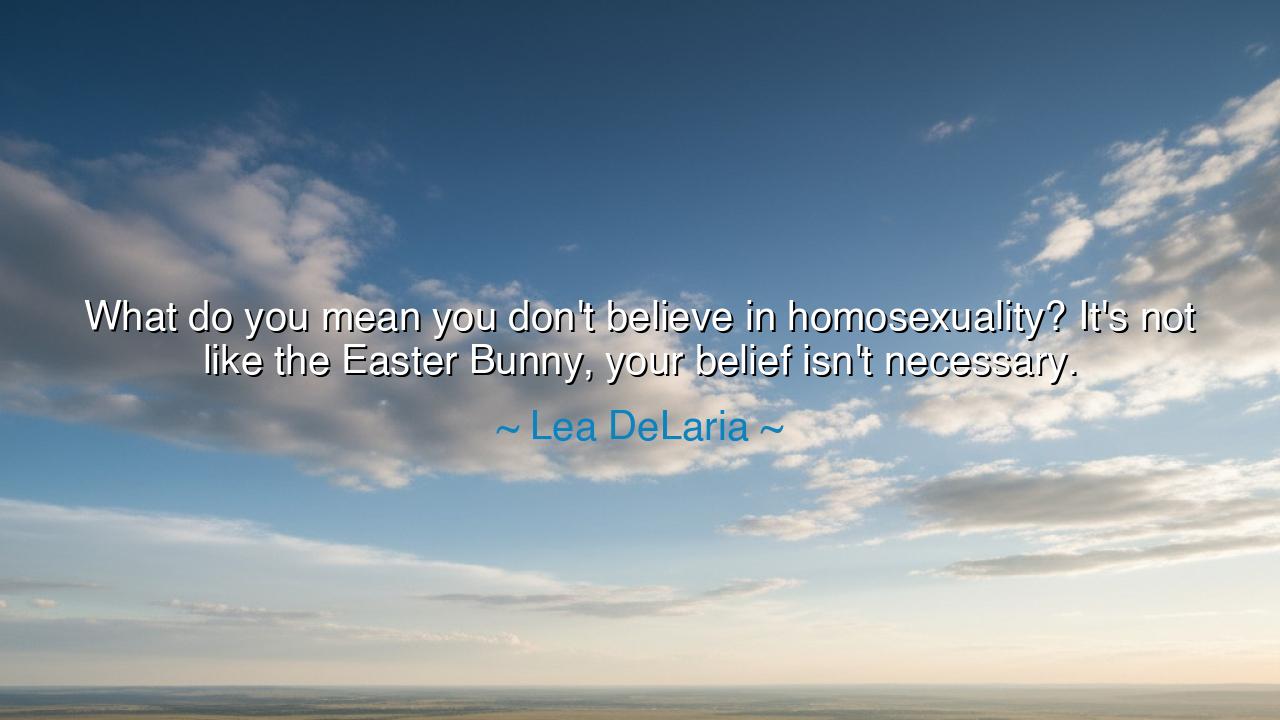
What do you mean you don't believe in homosexuality? It's not
What do you mean you don't believe in homosexuality? It's not like the Easter Bunny, your belief isn't necessary.






The words of Lea DeLaria—“What do you mean you don't believe in homosexuality? It's not like the Easter Bunny, your belief isn't necessary”—resound like a clarion call for truth in an age clouded by prejudice. Beneath their humor lies a profound and defiant wisdom: the reminder that human existence does not depend on another’s approval. DeLaria, a comedian and activist who broke barriers as one of the first openly gay performers on American television, spoke not from bitterness but from clarity. She saw how society often mistakes opinion for authority, how ignorance cloaks itself as morality—and with wit as sharp as a sword, she shattered that illusion.
In her statement, DeLaria declares an eternal principle of human dignity: that reality exists independent of belief. The sun rises whether one acknowledges its light; gravity binds the earth regardless of denial; and love, in all its forms, exists without needing permission. When she says homosexuality is not like the Easter Bunny, she exposes the absurdity of debating the reality of others’ lives as though they were fables. The Easter Bunny is a myth sustained by imagination—but identity, truth, and love are not myths. They are facts of being, woven into the fabric of creation itself.
Her words echo an ancient truth known to philosophers and prophets alike: truth is self-existent. The Stoics taught that nature is its own justification—that what exists, exists rightly, because it flows from the order of the universe. So too, DeLaria speaks from that lineage of wisdom. She refuses to let the existence of queer lives be treated as hypothesis or heresy. Her defiance is not rebellion; it is a reclamation of what was always sacred—that no person’s worth, identity, or right to love can be validated or erased by another’s belief.
History itself bears witness to this struggle between truth and denial. Consider Galileo Galilei, who stood before the tribunal of his time accused of blasphemy for asserting that the Earth revolves around the sun. The Church demanded his recantation, but the cosmos did not. Galileo, in his quiet courage, whispered, “E pur si muove”—and yet it moves. The planets cared nothing for the disbelief of men. Likewise, those who deny the reality of homosexuality stand in the same shadow of ignorance. For truth does not yield to opinion—it endures, patient and undefeated, until ignorance tires of its own noise.
DeLaria’s insight also strikes at a deeper moral truth—that belief is not ownership. Too often, societies have tried to control what they do not understand: the heretic, the foreigner, the woman, the queer. Yet belief, in its highest form, is not a weapon but a recognition. To “believe in” something is not to give it permission to exist, but to align oneself with its truth. Thus, when she mocks the idea of “believing” in homosexuality, she strips away centuries of arrogance. She reminds humanity that our task is not to legislate existence, but to learn how to love within it.
Her words shine as both sword and mirror—cutting through hypocrisy while reflecting our shared humanity. In every age, there are those who confuse morality with comfort, who seek to define others so they need not question themselves. But DeLaria’s voice, like that of the prophets of old, calls us to awaken—to see that the measure of a society’s greatness lies not in how it tolerates difference, but how it honors it. For the heart of civilization is not uniformity—it is diversity embraced with wisdom.
The lesson, then, is clear and timeless: reality does not bend to belief, but belief can be transformed by reality. Let no person waste their spirit denying the truths of others. Instead, let each heart cultivate empathy, for empathy is the highest form of understanding. Judge less, listen more, and know that love—like light—needs no permission to shine. In the words of Lea DeLaria, the laughter of truth carries with it the wisdom of the ages: to deny another’s being is not disbelief—it is blindness. And the cure for blindness has always been the same: to open one’s eyes and finally see the world as it is—vast, varied, and infinitely alive.






AAdministratorAdministrator
Welcome, honored guests. Please leave a comment, we will respond soon